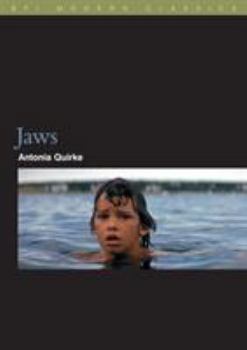Jaws
(Part of the BFI Film Classics Series)
Jaws divides critics into those who dismiss it as infantile and sensational, and those who see the shark as freighted with political and psychosexual meaning. The author argues that both interpretations obscure the film's success as a work of art.
Format:Paperback
Language:English
ISBN:085170929X
ISBN13:9780851709291
Release Date:August 2002
Publisher:British Film Institute
Length:96 Pages
Weight:0.44 lbs.
Dimensions:0.3" x 5.4" x 7.6"
Customer Reviews
2 ratings
A Decent Bite
Published by Thriftbooks.com User , 16 years ago
The 1970s saw a lot of disaster movies which kept viewers on edge. To a newer generation, Jaws may seem like little more than one of the best. But it was far more. Given a morose novel to work with, director Steven Spielberg not only exceeded expectations for the final product but created a whole new event in the world of cinema - the summer blockbuster. The plot of Jaws is well known. One big - really big - shark decides dining is particularly good off the shores of Amity and decides to sample the buffet. It is up to our heroes to take the fish out. As the author of this monograph notes, Spielberg made a wise, but no doubt unusual, choice of not showing the shark in its full glory until later in the film. Instead, the shark terrorizes not only the citizens of Amity, but the viewers in the theater, more by the atmosphere it creates than by its actual presence. Antonia Quirke breaks JAWS (the BFI book) into two sections, consistent with the action in the movie. The first part takes place on The Land. The second part takes place on The Sea. On land, it is Police Chief Martin Brody who takes center stage. Having moved to Amity from New York City to make a difference, he now sees his decisions about life and death (through his desire to close the beach) vetoed by the mayor, a cog of bureaucracy standing in the way of getting things done as greasy as any Brody might have encountered in the Big Apple. The effect that this has on Brody, and shark expert Hooper as he comes into focus, is explored. In the seond part, The Sea, it is Quint, the sharker, who takes the center. The movie takes place on his stage, specifically his boat Orca. The shark represents more than just one more animal to Quint. It represents the loss of his friends, eaten by sharks in the waters during World War II, and Quint's subsequent alienation from the rest of society. Although the trio may seem like a comic trio at times, Brody and Hooper are playing the saps to Quint's straight guy and their characters are displayed as reflections off of the dominant personality. Stronger than a lot of titles in the British Film Institute series, JAWS is a worthwhile read. Of course, one has to want a deeper understanding of the movie to begin with. Not everyone is a movie buff. Some people just want a good fish story.
Great discussion of the film, albeit with flaws
Published by Thriftbooks.com User , 21 years ago
This is my favorite of the BFI Modern Classics books so far, but Ms. Quirke should have researched the film's dialogue a bit more closely. She misquotes several lines and gets the sequence of a few scenes wrong. Granted, she has some interesting things to say about many aspects of the film, and I really enjoyed the book on the whole. I even underlined a few passages I particularly liked, as geeky as that may sound, but that may be partially attributable to the fact that I am still in college, do a lot of reading for classes, and underline stuff out of habit.As a LONG-time fan of "Jaws" and one who knows that film quite intimately after dozens and dozens of viewings, I can assert with absolute confidence that there are too many misquoted dialogue lines for me to ignore the fact that her research into specific elements of the film was insufficient. That said, I liked her writing style, and her insight in regard to many areas of the film was fascinating and enlightening.All the BFI Modern Classics entries tend to run about the same number of pages, and in the case of Quirke's discussion of "Jaws", it is far too few. I also read the BFI books on "Heat", "John Carpenter's 'The Thing'", and have the ones for "L.A. Confidential", "Se7en", and "The Silence of the Lambs" on order. The books are inexpensive enough that if you don't like or agree with the assorted authors you are not going to bemoan the wasted $$. But if you enjoy them, as I have so far, you will certainly consider the small sums to be money well-spent.






